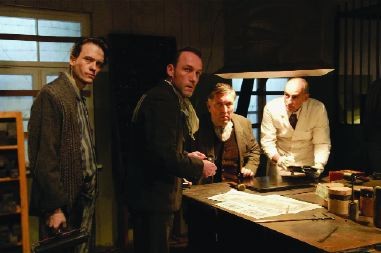The Counterfeiters

The Austrian picture The Counterfeiters, which won this year’s Academy Award for best foreign film, dramatizes yet another little-known story of the Holocaust. In “Operation Bernhard” the Nazis assembled a select band of prisoners at Sachsenhausen concentration camp and put them to work producing counterfeit versions of the English pound note and the American dollar bill. The prisoners were rewarded with food and clothes and soft beds to sleep in.
The operation was Heinrich Himmler’s idea for bringing down the British and American economies. According to Stefan Ruzowitzky’s movie, the scheme failed only because one of the prisoners, Adolf Burger (August Diehl)—whose memoir provided the source material for the movie—kept sabotaging it.
What makes the story even more unusual is that the inmate in charge of the operation was Salomon Sorowitsch (Karl Markovics), a Russian-Jewish émigré to Austria who was at one time the most notorious counterfeiter in Europe. The movie begins intriguingly with a postwar story centered on Sorowitsch. He is spending money like mad at a casino when he stops to reflect on his past. The opening images are beautifully shot by Benedict Neuenfels.
The early sections of the flashback are engaging. They show us how Sorowitsch continued to lead the high life even after other Jews were tossed in ghettos, and then how, sentenced to a labor camp, he drew on his skills as an artist to earn special status by painting Nazi propaganda posters and portraits of SS officers. It’s when he’s sent to Sachsenhausen and thrown in with the morally righteous Burger, a tubercular young Russian named Kolya (Sebastian Urzendowsky) and other counterfeiters that the movie becomes dreary and relentless. It’s also at this point that the film acquires an anemic look, as if we needed poor lighting to remind us about the horrors of the concentration camp.
Ruzowitzky (who also wrote the script) isn’t much of a filmmaker. He has a habit of leaving out plot details, only to thrust them into the narrative when a scene requires them. And he doesn’t know how to create the geography of an environment—we never get a sense of the relation between these counterfeiters’ workplace and the rest of the camp. He doesn’t know where to put the camera, and he’s not especially good with actors.
Worse, Ruzowitzky is a lurid melodramatist. He jacks up the movie with whatever devices he can think of—outbursts of violence, accelerated volume, hand-held camera, slow motion. There’s no stylistic unity. The acting is perfectly naturalistic until Herzog (Devid Striesow), the officer Himmler has appointed to supervise Operation Bernhard, brings Sorowitsch home to visit his family. (He wants the criminal to prepare phony papers so his family can survive the end of the war.) Suddenly Hille Beseler, who plays Herzog’s wife, acts in an over-the-top caricatured style that suggests a sketch on Saturday Night Live. The constant shifting of styles adds to the jangling, nervous pace.
Another example of the wrong tone: After the Nazis abandon Sachsenhausen, with Allied planes fly overhead, one of the men working under Sorowitsch shoots himself. He is clutching to his chest a pile of children’s passports, which were among the documents belonging to Jews murdered at Auschwitz. To wring tears out of the audience, Ruzowitsky prolongs the agony of the man’s death—he uses slow motion to show Sorowitsch picking up his comrade’s corpse and carrying it through the camp.
There’s nothing morally bankrupt about setting an adventure movie in a concentration camp. After all, the most enjoyable escape picture ever made, The Great Escape, is set in a German prisoner-of-war camp. And The Counterfeiters is a true story. But there is something false and self-important about the way Ruzowitzky draws us into his movie with the promise of adventure and then uses every trick in the book to try to suggest that this is a movie with moral weight.




